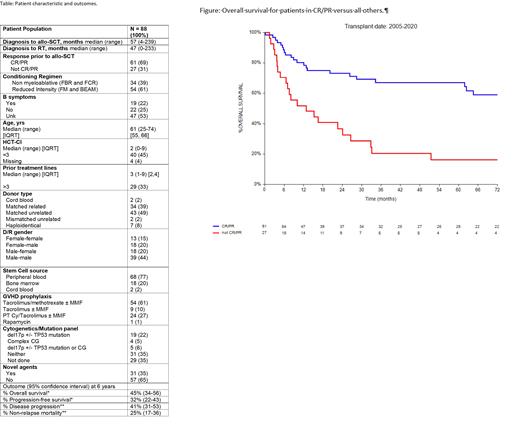Introduction: Richter transformation (RT) describes the emergence of an aggressive lymphoma in the setting of chronic lymphocytic leukemia (CLL). The prognosis is poor, with a median overall survival (OS) of 10 months. Treatment of RT is still challenging despite the availability of novel agents, and stem cell transplant (SCT) is commonly used as a consolidation strategy. Data on outcomes post-allogeneic-SCT for RT is limited. The OS on these reports' ranges from 41 to 75%. Methods: We conducted a retrospective study of patients diagnosed with RT at our center who underwent allogeneic SCT between 2005 and 2022. We evaluated predictors of outcome using Cox's proportional hazards regression analysis for overall and progression-free survival (PFS) and Fine and Grey regression for disease progression and non-relapse mortality (NRM). Results: 88 patients were identified, 85 had a diffuse large lymphoma histology and 3 Hodgkin's lymphoma. The median age was 61 years (range 25-74), and the majority (n=61, 69%) of patients were in complete response (CR, N=21) or partial response (PR, N=40) pre-SCT. Median follow-up among survivors was 74 months (range: 8-168); all outcomes are reported at 6 years. Overall, OS was 45% (95% CI: 34-56), and PFS 32% (95% CI: 22-43). The cumulative incidence of disease progression was 41% (95% CI: 31-53) and NRM 25% (95% CI: 17-36). In the univariate analysis, response prior to transplant was the most significant predictor of disease progression, OS, and PFS. Patients in CR/PR had a lower rate of disease progression (32% vs. 61%, HR: 0.2, 95% CI 0.2-0.6, p=0.002) and higher OS (59% vs 16%, HR: 0.3, 95% CI 0.2-0.5, p<0.001, Figure) and PFS (44% vs. 6%, HR: 0.2 (0.1-0.4), p<0.001) compared with those advanced (>CR2)or progressive disease. In addition, the presence of deletion 17p (del17p) or TP53 mutation was associated with a higher rate of disease progression (HR=3.1, 95% C 1.3 -7.3, p=0.01), but not with PFS or OS. The use of reduced intensity regimens resulted in favorable OS (HR=0.5, 95% CI 0.3-1.0, p=0.05) as compared to non-myeloablative conditioning. Age, HCT-CI score, donor type, donor-to-recipient gender, cell source, and graft-versus-host disease prophylaxis, or the presence of other cytogenetic abnormalities were not significantly associated with OS, PFS, disease progression, or NRM. There was also no advantage for any outcome when comparing individuals who achieved CR versus PR pre-SCT. The independent predictive value of CR/PR was confirmed in multivariate analysis for OS (HR=0.3, 95% CI 0.2-0.5, p<0.001) and disease progression (HR=0.4, 95% CI: 0.2-0.8, p=0.01), after adjusting for conditioning intensity for OS and deletion 17p (del17p) or TP53 mutation for disease progression. Discussion: In this single center series of patients treated with allogeneic SCT as consolidation for RT, disease status prior to SCT (CR/PR) emerged as a strong independent predictor of outcomes. The influence of tumor burden prior to SCT may be related to disease biology (e.g., patients not in CR/PR may have more aggressive RT) or may be related to decreased graft-versus-lymphoma effect. Based on our findings, we recommend that aggressive control of the disease with the goal of achieving a CR or PR should be attempted before allogeneic stem cell transplantation in patients with Richter transformation.
Disclosures
Shpall:Axio: Membership on an entity's Board of Directors or advisory committees; Takeda: Other: License agreement; Affimed: Other: License agreement; Fibrobiologics: Membership on an entity's Board of Directors or advisory committees; Celaid Therapeutics: Membership on an entity's Board of Directors or advisory committees; Navan: Membership on an entity's Board of Directors or advisory committees; Adaptimmune: Membership on an entity's Board of Directors or advisory committees; NY Blood Center: Membership on an entity's Board of Directors or advisory committees; Syena: Other: License agreement. Qazilbash:Bioline: Other: Advisory board; Amgen: Research Funding; Janssen: Research Funding; NexImmune: Research Funding; Angiocrine: Research Funding. Bashir:Stemline: Research Funding; Acrotech: Research Funding; GSK: Research Funding; Pfizer: Research Funding. Nieto:Astra Zeneca: Research Funding; Secura Bio: Research Funding; Affimed: Research Funding. Marin:Affimed: Patents & Royalties; Takeda: Patents & Royalties. Srour:Orca Bio: Research Funding. Kebriaei:Pfizer: Consultancy, Honoraria; Jazz: Consultancy, Honoraria. Ferrajoli:Beigene: Research Funding; GenMab: Research Funding; Genetech: Honoraria; AstraZeneca: Honoraria, Research Funding; Abbvie: Honoraria, Research Funding; Janssen: Honoraria. Wierda:Miragen: Research Funding; Numab THerapeutics: Research Funding; Sunesis: Research Funding; GlaxoSmithKline: Research Funding; Janssens Biotech Inc: Research Funding; Juno Therapeutics: Research Funding; Accutar Biotechnology: Research Funding; Loxo Oncology, Inc./Lilly: Research Funding; Nurix THerapeutics: Research Funding; KITE Pharma: Research Funding; National Comprehensive Cancer Network: Other: Nonrelevant Financial Relationship/Chair, CLL). Supported by the NIH/NCI under award number P30 CA016672 and used MDACC Cancer Center Support Grant (CCSG) shared resources; Oncternal Therapeutics, Inc.: Research Funding; Bristol Myers Squibb (Juno & Celgene): Consultancy, Research Funding; Janssens Biotech: Research Funding; Cyclacel: Consultancy, Research Funding; NIH P30 CA016672/MDACC Cancer Center Support Grant: Research Funding; GSK/Novartis: Research Funding; Gilead Sciences: Research Funding; AbbVie: Consultancy, Research Funding; Genentech: Research Funding; Pharmacyclics LLC: Research Funding; AstraZeneca/Acerta Pharma: Consultancy, Research Funding. Champlin:Actinium Pharmaceuticals: Consultancy; Omeros: Consultancy; Arog: Consultancy; Kadmon: Consultancy; Johnson & Johnson/Janssen: Consultancy; Cell Source: Research Funding; Takeda Corporation: Patents & Royalties; Orca Bio: Consultancy.


This feature is available to Subscribers Only
Sign In or Create an Account Close Modal